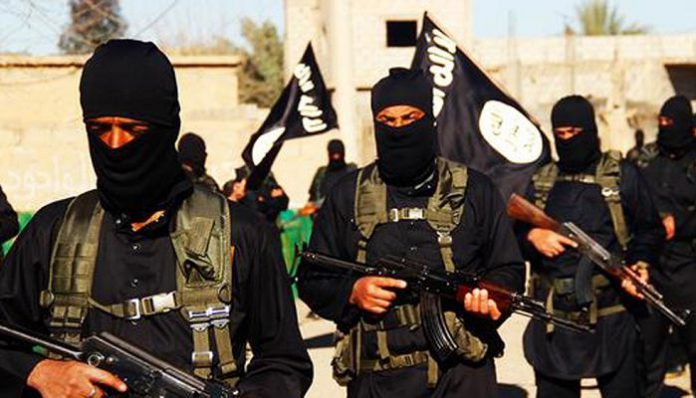The Islamic State in Iraq and the Levant (ISIL) is reorganizing in a number of countries, including Turkey, the Nordic Monitor news website reported, citing an indictment drafted by the Diyarbakır Chief Public Prosecutor’s Office and submitted to the court in August.
The report by Nordic Monitor’s Levent Kenez, citing the indictment, notes that weapons training is taking place in Georgia and that there has been an influx of jihadists from Turkey to West Africa.
Based on information in the indictment, ISIL is conducting restructuring efforts under the name Mekteb-i Furkan (Furkan School) in Turkey as well as in Georgia, Azerbaijan, Russia, Ukraine, Chechnya, Mali, Uganda and Sudan.
The indictment was prepared following May operations carried out across 23 Turkish provinces. It came to light that ISIL had established a fresh framework operating under the guise of a bookstore. This newly identified structure was found to be operational not only in Turkey but also in several other countries. The police had detained 74 suspects during an operation ordered by the Diyarbakır Chief Public Prosecutor’s Office.
According to a report by journalist Hale Gönültaş, a striking detail in the indictment is the fact that jihadists who entered Turkey illegally and hid there later moved to West Africa under the guise of conducting humanitarian aid activities. Turkish jihadists, working at various NGOs affiliated with ISIL and jihadist groups, are traveling to Uganda, Mali and Sudan as aid personnel. The justification provided for their journeys abroad revolves around “sinking wells, founding orphanages and extending financial aid to children who are purportedly without parental care.”
The allegations that ISIL was organizing in Turkey through NGOs had previously been brought up. However, an investigation into nongovernmental organizations allegedly linked to ISIL was hindered by the government of President Recep Tayyip Erdogan.
Proposed by the main opposition Republican People’s Party (CHP) on May 27, 2019, a motion to probe ISIL-linked NGOs was submitted to the Parliament Speaker’s Office. This initiative was sparked by revelations made in court hearings about terrorist attacks, during which some ISIL suspects identified certain NGOs as key players in recruitment and financial transactions. However, despite these efforts, the motion never made it to the government’s agenda. The government, run by Erdoğan’s Justice and Development Party (AKP) and its nationalist allies, effectively halted the attempt to scrutinize the ISIL network within the country.
In a 2021 article, Nordic Monitor reported that jihadists were conducting overseas funds transfers under the guise of humanitarian activities. For instance, an al-Qaeda-affiliated organization, operating under the cover of a charity, continuously raised funds in Turkey to support jihadist groups in Syria, Africa and Southeast Asia, aided by the Turkish banking system, while authorities seemingly turned a blind eye.
An entity named Ahsen İlim Kültür Eğitim ve Yardımlaşma Derneği (Ahsen Wisdom Culture, Education and Aid Association, or Ahsen-Der), which serves as a front charity, has been actively sending fighters and supplies to al-Qaeda-affiliated groups in various countries. This association has expanded its presence in provinces near the Turkish-Syrian border, despite being flagged as a jihadist organization. Its members and related entities were previously implicated in Turkish criminal investigations involving al-Qaeda and ISIL networks within Turkey. Additionally, Ahsen-Der’s activities extend to multiple countries in Africa and Southeast Asia.
It emerged that the Turkish government, in a decision published on November 30, 2022 in the Official Gazette, had taken steps to freeze the assets of 17 individuals, 16 of whom were resident in Turkey. The reason cited for this action was their alleged affiliation with ISIL. Strikingly, 14 of these people who reside in Turkey have been granted Turkish citizenship, and it’s noteworthy that all Turkish residents involved have tax identification numbers.
Nordic Monitor reported last week that the leader of the ISIL group in Sudan, a country beset by internal conflict, has been directing operations through Turkey, according to United Nations investigators.
In a report submitted to the UN Security Council in July, investigators stated that an Iraqi national named Abu Bakr Al-Iraqi, a veteran figure within ISIL, is overseeing ISIL cells in Sudan and financing operations through illicit means in Turkey.
The report referenced intelligence from a UN member state indicating that Al-Iraqi had established multiple businesses under false identities in both Sudan and Turkey. He reportedly manages several money exchanges and a tourism agency in Turkey while also maintaining significant investments in Sudan.

The UN report also highlighted that ISIL and jihadist groups still perceive the northwest region of Syria as a potential gateway to Turkey and a safe haven where it can blend into the local population. Within this context, Hay’at Tahrir al-Sham (HTS) remains the dominant terrorist group, effectively controlling the area. HTS commands a force of 7,000 to 12,000 fighters, including around 1,000 foreign terrorists.
The latest data shared by the Turkish Interior Ministry in February regarding detained suspects affiliated with ISIL suggests that the leniency previously demonstrated by the Turkish judicial system toward jihadist militants still persists.
Turkish law enforcement conducted a total of 1,042 operations in the previous year, leading to the apprehension of 1,981 individuals suspected of having ties to ISIL. Of this number, more than 600 were formally arrested, while the remaining were released. This indicates that approximately two out of every three ISIL suspects were set free by the police, prosecutors or the courts following brief periods of detention.
Turkey’s lack of transparency in the fight against radical jihadist groups, particularly against ISIL, is well known. Turkish authorities tend to announce numbers of detained ISIL suspects following operations that many believe are inflated, and it is not transparently stated how many of them have been arrested or convicted. There is also a significant gap between the figures of the interior and justice ministries. After growing criticism, the interior ministry, which had published the statistics of terror suspects detained every month since 2017, stopped releasing the figures on its website in 2020.

